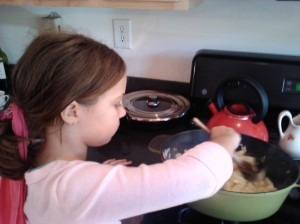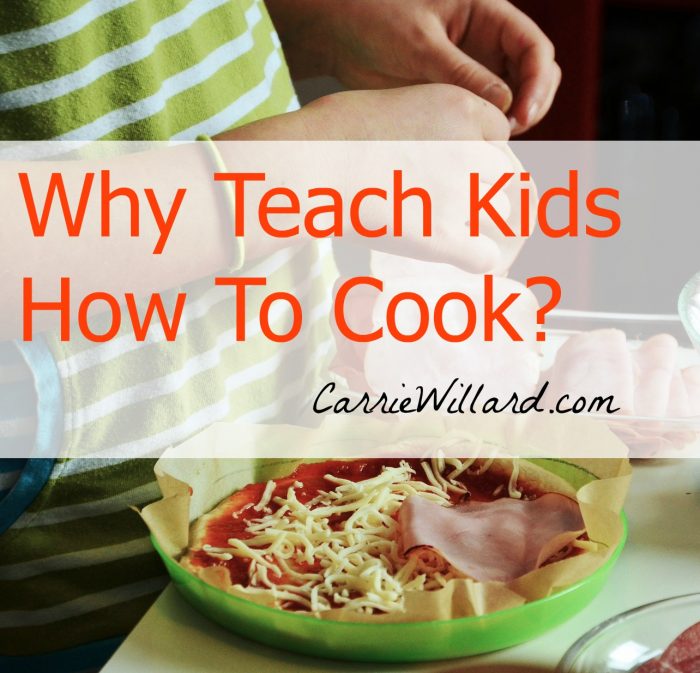I’m a firm believer in teaching kids how to cook. While it’s not always easier, or faster, or even simpler in the short term, it’s definitely better in the long term. Which is true of many aspects of parenting, no?
Why Teach Your Kids To Cook?
First I’ll start with the selfish reasons. This gooey bit of deliciousness pictured below is homemade flan, cooked with love by my then 12 year old son. I’ve never cooked flan in my life, but I sure do enjoy eating it.

Teaching your kids to cook eases the day to day burden of preparing meals for your family.
That’s reason enough right there. If you are invested in the idea of preparing whole foods, avoiding packaged foods and general junk, then keeping the family fed is a huge job.
If your kids can cook, they can help you with this important task. That’s certainly helpful from day to day, but it’s completely invaluable at times. For instance, when there is a new baby in the house, a mom sick with morning/noon/night sickness of pregnancy, illness in the household, etc.
Here’s a general guideline. By the age of 7, a child is perfectly capable of using the stove, and sharp knives if s/he has been taught how and observed you for a long time. And most kids show an interest in cooking from a very young age. At 20 months, my toddler begs to “sit there” (perched on the kitchen counter) so she can watch and help me prepare dinner.
My 6 year old can: cook scrambled eggs, fry a grilled cheese sandwich, make toast, prepare tuna or chicken salad, and of course slap together a PB&J.
The 9 year old can: do all the above plus make a quesadilla, cook rice and oatmeal, bake cookies and muffins, and fry eggs.
The 11 year old can do all the above plus cook deviled eggs and fry bacon.
The 13 year old can do all the above plus bake bread, make pies from scratch, and more. Once he cooked an entire meal on his own as a treat for me at the age of 9. And let’s not overlook the value of teaching kids how to operate the coffee maker!
(My stepdaughter is 12, and when I married my husband she didn’t know how to do anything in the kitchen. Since then she’s become more comfortable preparing food on her own, and I hope I had something to do with that.)
If you’re too busy/stressed/impatient to let the kids help you cook now, you won’t benefit from them knowing how to cook later.
And they’ll miss out on valuable lessons in the meantime.
Namely:
Teaching kids to cook prepares them for the future.
At some point, all human beings must feed themselves or others. It’s just as important as learning to wipe your own backside after going poo. Mom won’t be there forever to do it for you.
Side rant: Personally I find it pathetic that many grown men have no clue how to work their way around the kitchen. Not knowing how to feed your own face isn’t manly at all. It’s weak and childish. And a bachelor diet of Waffle House and Taco Bell is expensive and bad for your health. Hence, it’s been important to me that my sons learn how to cook before leaving my home. They took to it naturally, but I wasn’t above reminding them that future girlfriends think a man who can cook is hot, and that the best chefs in the world have historically been male.
I love how the Deputy Headmistress put it here:
“I do not want my son to be helpless without a woman in his life. If his wife gets sick I want him to be able to be supportive and not an added burden and hindrance. I want him to know how to get some basic meals together for his family so that if meals are left to him at any time for any reason he can rise to the occasion without breaking the family budget.”
Here are some other reasons why it’s a good idea to teach your children to cook.
Do the Math
It’s nearly impossible to cook without doing some math. Whether you’re cutting a whole recipe in half (or in the case of our family, doubling or tripling most recipes!) or just measuring out cups of flour, it’s a great way to incorporate real world math skills. Cooking may help children see that math has a practical application in the real world. By the time my kids got around to doing fractions, they understood the concept intuitively, probably from years of following recipes with me or on their own.
An Anti-Pickiness Weapon

Pictured above is my only picky child. The others eat whatever is put in front of them. They may tell me later that they didn’t like whatever was presented, but they’ll still eat it without complaint. I’ll write about my picky eater philosophy later, but for now suffice it to say that she is more likely to eat food that she has had a hand in preparing (such as the potato soup she’s cooking up above).
Appreciation
Teaching children to cook is a powerful learning experience, yet children do not view cooking as “chores”, they view it more as fun. Therefore they’re more likely to want to participate. I think that cooking helps children develop an appreciation for good food.
In my review of Bringing Up Bebe I touched on this. According to the author, French children often spend their weekends baking, and there are special recipes just for kids. There are tons of French cookbooks exclusively for kids. All this cooking may have something to do with developing a love for fine food. Children seem to have a lot of pride in food they’ve helped prepare. In contrast, junk food, fast food doesn’t require any work or preparation.
Teaching Nutrition
As your children learn to cook, they are learning a powerful tool to take control of their own health. A parent’s job isn’t complete if they haven’t taught their children about how to stay healthy by eating well. Food can be your medicine, and home cooked food (even if it’s sweets) is almost always nutritionally superior to store bought or restaurant food. If your children learn how to cook, they can give their body what it needs nutritionally, both now and in the future.
Having kids plan the menu and cook eases the burden on you, and as previously mentioned, they’re more likely to eat it.
A Word About Safety
Some people bring up the objection that kids can hurt themselves in the kitchen. In my experience, this danger is highly overstated. In 14 years of parenting, my kids have only experienced one kitchen accident. My daughter’s dislocating her elbow on the monkey bars at the playground doesn’t mean I’m never taking my kids to the park again. And that one accident doesn’t outweigh the myriad benefits of bringing kids into the kitchen.
One last thing: Teaching your kids to cook is an excellent way to spend one on one time with them.
Any other thoughts? Do your kids love to cook? When do you start bringing them into the kitchen with you to help?

I am right there with you Carrie — I just find it hard to implement right now. 🙁
I spent 3 hours in the kitchen tonight.. making pasta with sauce for dinner, cooking rice for dh as he was unwell, prepping corn on the cob, making jelly, cutting up and putting some fruit out and tidying up after all was said and done. THREE HOURS. And this is without the children’s help (which makes things go slower) and the newborn that’s due this week (which will keep me from accomplishing tasks in record time)! I can’t keep this up and dh and I are firm believers in healthy, home cooked food… What to do? I want to teach the kids but the amount of time spent in the kitchen already, is ridiculous. Any thoughts?
I understand, it really is a job isn’t it? I think some of it is inevitable, and I would rather spend time in the kitchen than spend time in the Doctor’s office.
Maybe it would help to assign each child a night to assist you? That way it’s just one child so it’s more manageable. I know a mom of 10 who does this. One kid in the kitchen at a time.